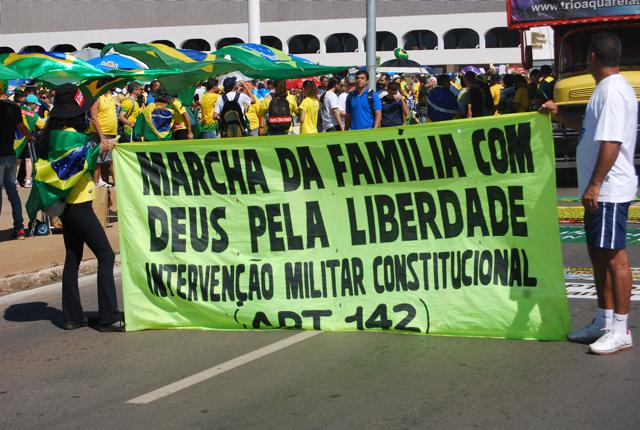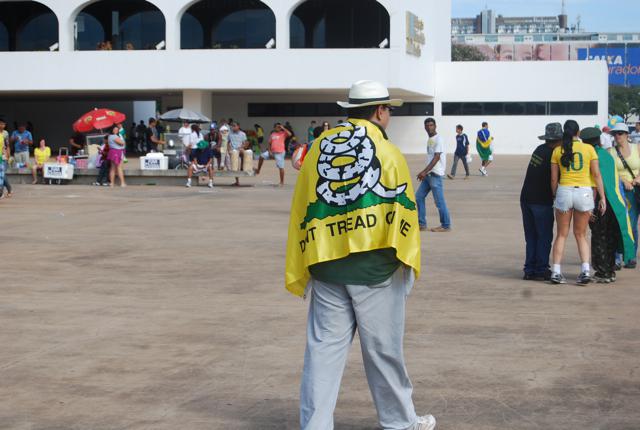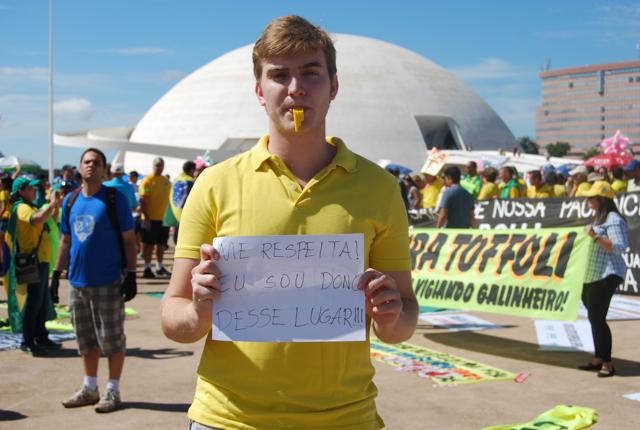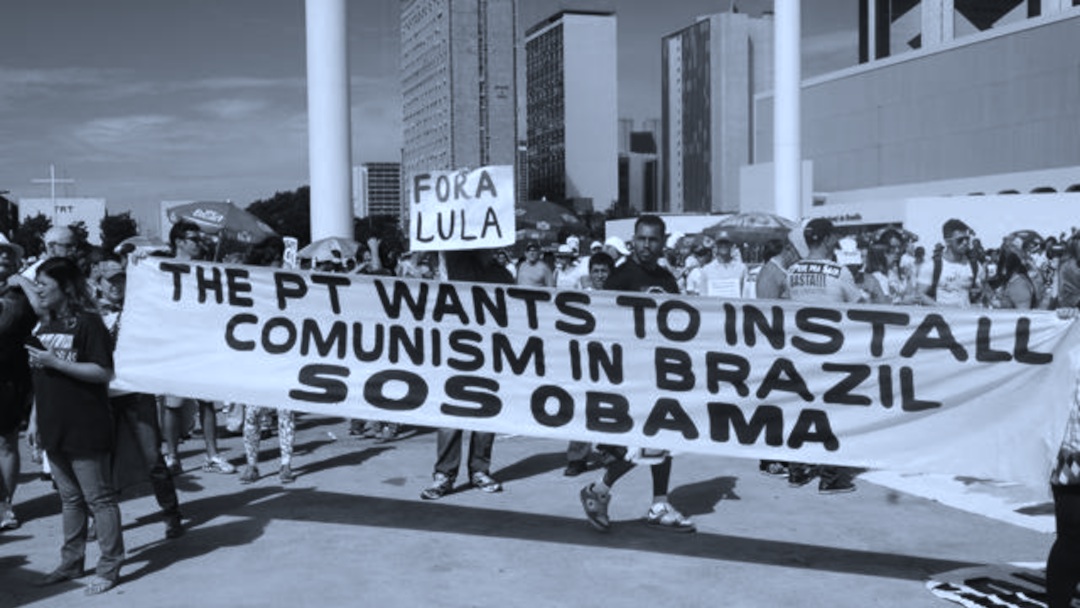Sunday, April 12, was supposed to be bigger than ever before. The same groups that organized Brazil’s March 15 demonstrations against Dilma Rousseff’s government via social media had planned a new wave of protests across Brazil. Today they are undoubtedly privately disappointed. The early crowd estimates indicate a drop of at least 50% in every major city. Perhaps it was simply weariness on the part of demonstrators. Or perhaps some protesters, alarmed by the lower house of Congress’s approval this week of a sweeping bill that permits outsourcing in practically any public or private business, see the governing Workers’ Party (PT), which vociferously opposes the bill, as the last protector against the complete dismantling of Brazil’s worker-friendly labor law, in place since the 1930s. Whatever the reason, the crowds were visibly smaller, and today the future of the anti-PT movement is uncertain.
Sunday morning, a friend and I made our way to Brasília’s Esplanade (Brazil’s equivalent of the National Mall in Washington), armed with a camera and a notebook, dressed in yellow and blue shirts to avoid accusations of being PT operatives. Writing about the movement, as I did last week when I argued that it is an elitist, upper-class reaction against progress for the nation’s poor under 12 years of PT governments, was one thing. This time, I had to see for myself.
If there was an emblematic moment for the demonstration, it came when the protesters, led by three sound trucks, arrived in front of Congress. Parked within a few feet of each other, each truck, which represented a different grassroots movement, blared out its own message—with complete disregard for what the others were saying. One featured speakers ranting against corruption and the PT. Another, in a moment reminiscent of American “birthers,” claimed that Rousseff isn’t even Brazilian, but rather Hungarian. (Rousseff’s father was a Bulgarian immigrant.) Another, led by pro-military coup demonstrators, alternated between paeans to the Armed Forces, military marches, and the national anthem, as a presumed veteran stood at attention before the national flag. There was no unified message. Impeachment? Some demonstrators we asked told us yes; others said no, they were simply speaking out against corruption and in favor of improved health care and education. Military intervention? Some were enthusiastic, as long as it only lasted a few months; a member of the military told us that he would never support a coup, but he wished someone would blow up Congress.

(Bryan Pitts)
If anything, the pro-military protesters were more vocal and numerous than the media portrayed after March 15. In addition to the expected, “SOS Armed Forces” signs, some of the worst (or best, depending on one’s perspective) included “My flag is green and yellow, not the red of the hammer and sickle,” and “March with God for the Family and Liberty” – a reference to massive right-wing marches of the same name that preceded the 1964 coup. Especially fascinating for an American observer was a man wrapped in a yellow Don’t Tread on Me flag, and a few feet away, a banner calling for U.S. intervention: “The PT wants to install Comunism [sic] in Brazil. SOS Obama.” The incongruity between adopting a symbol of the Tea Party and begging for the help of the President the Tea Party considers a communist seemed to go unnoticed.

(Bryan Pitts)
What did appear to unite the protesters was their social class, color, and disdain for those they consider their social inferiors. I saw fewer than a dozen protesters who could be classified as black in Brazil; indeed, they were far outnumbered by blonds. My favorite was a light-skinned, blond young man carrying a hand-written sign. “Respect me. I run this country.” While he probably meant it as a call to respect his voice as a citizen, the irony was rich. A cheerful, friendly group of women with whom I spoke said that they were horrified by the idea of military intervention, scoffed at the idea that impeachment will happen, and remarked that it’s silly to expect to replay an election. Voices of reason, I wondered? Until one of them launched into a tirade about how these protests mattered, because they included the best and most respectable Brazilians. “Brazilians,” she remarked, apparently not including herself or fellow demonstrators among them, “are a completely stupid people.” The message was clear. The voices of the rich matter. The poor are too ignorant, too easily led astray, for their opinions to count.

(Bryan Pitts)
The only visibly working-class people I saw were the vendors trailing the protest with wheeled ice chests full of bottled water and beer and armfuls of anti-PT paraphernalia. Were they just there to make money, or did they support the protests? I asked one woman selling water. “I think this is great,” she said, “I agree with it all.” Even the requests for military intervention, I asked. “Absolutely,” she replied, insisting that only the military could fix the country’s mess. While she was only one out of many, and while she may have been strategically echoing the protests to enhance her sales, her comments made me wonder, once again, if the working class’s support for the PT might be less solid than one might expect after the progress of the last 12 years.
After three hours, the protest wound down. As I made my way back to Brasília’s central bus station, at the west end of the Esplanade, I noticed how few yellow-and-green-clad protesters were using public transportation to get home. I guess they drove.
Special thanks to Felipe Freitas for speaking with protesters and helping formulate the analysis.
Reproduced with permission of author.

